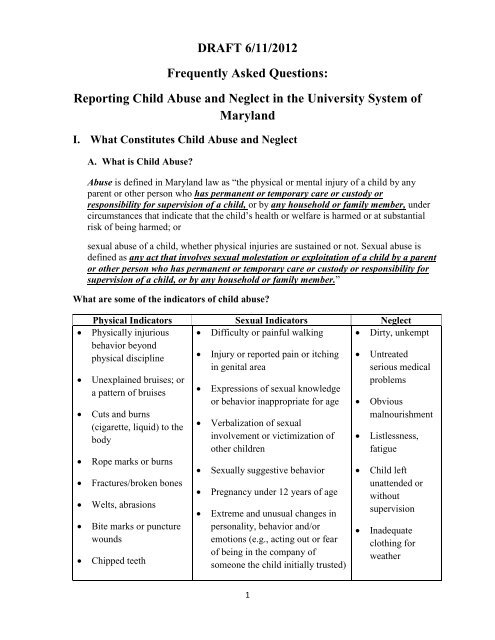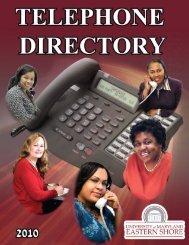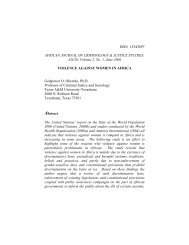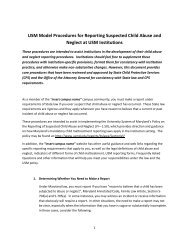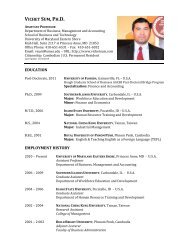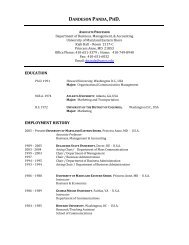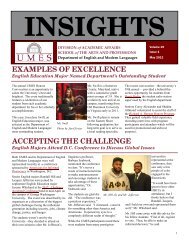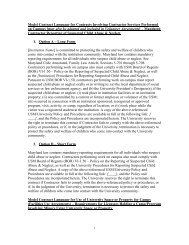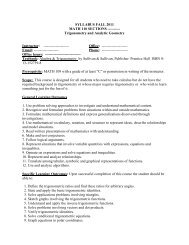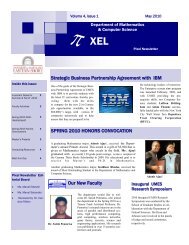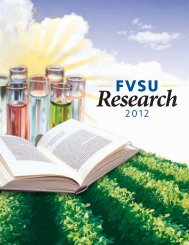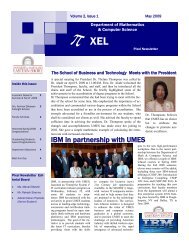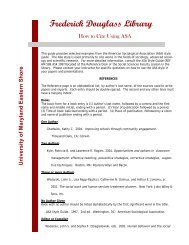Frequently Asked Questions Reporting Child Abuse and Neglect in ...
Frequently Asked Questions Reporting Child Abuse and Neglect in ...
Frequently Asked Questions Reporting Child Abuse and Neglect in ...
You also want an ePaper? Increase the reach of your titles
YUMPU automatically turns print PDFs into web optimized ePapers that Google loves.
DRAFT 6/11/2012<br />
<strong>Frequently</strong> <strong>Asked</strong> <strong>Questions</strong>:<br />
<strong>Report<strong>in</strong>g</strong> <strong>Child</strong> <strong>Abuse</strong> <strong>and</strong> <strong>Neglect</strong> <strong>in</strong> the University System of<br />
Maryl<strong>and</strong><br />
I. What Constitutes <strong>Child</strong> <strong>Abuse</strong> <strong>and</strong> <strong>Neglect</strong><br />
A. What is <strong>Child</strong> <strong>Abuse</strong>?<br />
<strong>Abuse</strong> is def<strong>in</strong>ed <strong>in</strong> Maryl<strong>and</strong> law as “the physical or mental <strong>in</strong>jury of a child by any<br />
parent or other person who has permanent or temporary care or custody or<br />
responsibility for supervision of a child, or by any household or family member, under<br />
circumstances that <strong>in</strong>dicate that the child’s health or welfare is harmed or at substantial<br />
risk of be<strong>in</strong>g harmed; or<br />
sexual abuse of a child, whether physical <strong>in</strong>juries are susta<strong>in</strong>ed or not. Sexual abuse is<br />
def<strong>in</strong>ed as any act that <strong>in</strong>volves sexual molestation or exploitation of a child by a parent<br />
or other person who has permanent or temporary care or custody or responsibility for<br />
supervision of a child, or by any household or family member.”<br />
What are some of the <strong>in</strong>dicators of child abuse?<br />
<br />
<br />
<br />
<br />
<br />
<br />
<br />
<br />
Physical Indicators Sexual Indicators <strong>Neglect</strong><br />
Physically <strong>in</strong>jurious Difficulty or pa<strong>in</strong>ful walk<strong>in</strong>g Dirty, unkempt<br />
behavior beyond<br />
physical discipl<strong>in</strong>e<br />
<br />
<br />
Unexpla<strong>in</strong>ed bruises; or<br />
a pattern of bruises<br />
Cuts <strong>and</strong> burns<br />
(cigarette, liquid) to the<br />
body<br />
Rope marks or burns<br />
Fractures/broken bones<br />
Welts, abrasions<br />
Bite marks or puncture<br />
wounds<br />
Chipped teeth<br />
<br />
<br />
<br />
<br />
<br />
Injury or reported pa<strong>in</strong> or itch<strong>in</strong>g<br />
<strong>in</strong> genital area<br />
Expressions of sexual knowledge<br />
or behavior <strong>in</strong>appropriate for age<br />
Verbalization of sexual<br />
<strong>in</strong>volvement or victimization of<br />
other children<br />
Sexually suggestive behavior<br />
Pregnancy under 12 years of age<br />
Extreme <strong>and</strong> unusual changes <strong>in</strong><br />
personality, behavior <strong>and</strong>/or<br />
emotions (e.g., act<strong>in</strong>g out or fear<br />
of be<strong>in</strong>g <strong>in</strong> the company of<br />
someone the child <strong>in</strong>itially trusted)<br />
<br />
<br />
<br />
<br />
Untreated<br />
serious medical<br />
problems<br />
Obvious<br />
malnourishment<br />
Listlessness,<br />
fatigue<br />
<strong>Child</strong> left<br />
unattended or<br />
without<br />
supervision<br />
Inadequate<br />
cloth<strong>in</strong>g for<br />
weather<br />
1
B. What is <strong>Child</strong> <strong>Neglect</strong>?<br />
Under Maryl<strong>and</strong> law, <strong>Neglect</strong> is def<strong>in</strong>ed as the failure to give proper care <strong>and</strong> attention to<br />
a child, <strong>in</strong>clud<strong>in</strong>g leav<strong>in</strong>g the child unattended, by a parent or other person who has<br />
permanent or temporary care or custody or responsibility for supervision of the child<br />
under circumstances <strong>in</strong>dicat<strong>in</strong>g:<br />
1) that the child’s health or welfare is harmed or placed at substantial risk of harm;<br />
or<br />
2) mental <strong>in</strong>jury to the child or a substantial risk of mental <strong>in</strong>jury.<br />
C. What is Mental Injury?<br />
“Mental <strong>in</strong>jury” is def<strong>in</strong>ed as the observable, identifiable, <strong>and</strong> substantial impairment of<br />
a child’s mental or psychological ability to function.<br />
D. Under what age is a person considered a “child” under Maryl<strong>and</strong> child abuse<br />
<strong>and</strong> neglect laws?<br />
For the purposes of Maryl<strong>and</strong>’s child abuse <strong>and</strong> neglect laws, a “child” is def<strong>in</strong>ed as any<br />
<strong>in</strong>dividual under the age of eighteen (18) years.<br />
E. How do I determ<strong>in</strong>e if physical discipl<strong>in</strong>e is considered child abuse?<br />
This is a complicated question. In some families <strong>and</strong> cultures, physical discipl<strong>in</strong>e<br />
(spank<strong>in</strong>g, hitt<strong>in</strong>g, <strong>and</strong> “whipp<strong>in</strong>g”) is a common practice <strong>in</strong> manag<strong>in</strong>g the behavior of<br />
children. Generally, physical discipl<strong>in</strong>e should be reported as abuse if it leaves an <strong>in</strong>jury<br />
<strong>and</strong> either harmed the child or put the child’s health <strong>and</strong> welfare at substantial risk of<br />
harm. <strong>Child</strong> Protective Services will then determ<strong>in</strong>e whether the punishment was abusive<br />
consider<strong>in</strong>g the totality of the circumstances, <strong>in</strong>clud<strong>in</strong>g the severity of the <strong>in</strong>jury, nature<br />
of the punishment, gravity of the act be<strong>in</strong>g punished, <strong>and</strong> the adult’s attempt to use other<br />
nonphysical means of discipl<strong>in</strong>e.<br />
F. How do I dist<strong>in</strong>guish between child sexual abuse <strong>and</strong> the crime of sexual assault?<br />
Under the child abuse report<strong>in</strong>g law, sexual abuse is def<strong>in</strong>ed as “any act that <strong>in</strong>volves<br />
sexual molestation or exploitation of a child by a parent or other person who has<br />
permanent or temporary care or custody or responsibility for supervision of a child or by<br />
any household or family member.” It <strong>in</strong>cludes a wide array of sexual conduct<br />
<strong>in</strong>clud<strong>in</strong>g such th<strong>in</strong>gs as exposure, sexual advances, <strong>and</strong> engag<strong>in</strong>g <strong>in</strong> the pornographic<br />
display of a child.<br />
Much of what is reported to <strong>Child</strong> Protective Services as child sexual abuse also<br />
constitutes a crime such as crim<strong>in</strong>al child sexual abuse, sexual assault, <strong>in</strong>cest, or rape.<br />
However, it does not always work the other way around: not every sexual<br />
2
assault perpetrated on a child is reportable to <strong>Child</strong> Protective Services as child sexual<br />
abuse. Unless a sexual act was perpetrated by a parent, household or family member, or<br />
other person car<strong>in</strong>g for or supervis<strong>in</strong>g a child, it is not considered reportable "child sexual<br />
abuse" even if it is unwelcome or nonconsensual touch<strong>in</strong>g that would constitute a sexual<br />
assault.<br />
Of course, if you should ever witness the sexual assault of the child—regardless of<br />
whether it fits the def<strong>in</strong>ition of child sexual abuse—you are encouraged to call 911 to<br />
report it.<br />
G. What if a student discloses that she was sexually abused at the age of five (5)<br />
perpetrated by another sibl<strong>in</strong>g who was n<strong>in</strong>e (9) at the time?<br />
Under Maryl<strong>and</strong>’s <strong>Child</strong> <strong>Abuse</strong> report<strong>in</strong>g laws, sexual abuse is def<strong>in</strong>ed as an “act that<br />
<strong>in</strong>volves sexual molestation or exploitation of a child … by any household or family<br />
member.” Given that the two children are “household members” you are m<strong>and</strong>ated to<br />
report. The case worker can make a determ<strong>in</strong>ation of whether it should be <strong>in</strong>vestigated.<br />
II. Basic <strong>Report<strong>in</strong>g</strong> Requirements<br />
A. What is the source of the child abuse <strong>and</strong> neglect report<strong>in</strong>g requirements <strong>in</strong> the<br />
USM policy?<br />
The purpose of the policy is to set out the m<strong>and</strong>atory report<strong>in</strong>g requirements that are<br />
established by State law as they apply to the USM. The source of those legal<br />
requirements is a set of statutes <strong>in</strong> the Family Law Article of the Maryl<strong>and</strong> Annotated<br />
Code, Sections 5-701 through 5-708. The policy also applies requirements established <strong>in</strong><br />
various Op<strong>in</strong>ions of the Attorney General that authoritatively <strong>in</strong>terpret the Family Law<br />
Article statutes, <strong>and</strong> it <strong>in</strong>cludes USM-specific requirements for report<strong>in</strong>g to designated<br />
<strong>in</strong>stitution officials when an <strong>in</strong>cident <strong>in</strong>volves members of the campus community or<br />
<strong>in</strong>stitution sponsored activities.<br />
B. Which USM employees must report child abuse <strong>and</strong> neglect?<br />
Under Maryl<strong>and</strong> Law, all adults <strong>in</strong> the State have an obligation to report suspected child<br />
abuse <strong>and</strong> neglect. However, the report<strong>in</strong>g requirements for members of the USM<br />
community are different, depend<strong>in</strong>g upon whether they are “professional employees.”<br />
The law m<strong>and</strong>ates that health practitioners, educators/professional employees, human<br />
service workers, law enforcement officers, or other professional employees, when act<strong>in</strong>g<br />
<strong>in</strong> a professional capacity, who have “reason to believe” that a child has been subjected to<br />
abuse or neglect to call <strong>Child</strong> Protective Services or the local police <strong>and</strong> notify the<br />
University President’s Designee for report<strong>in</strong>g child abuse <strong>and</strong> neglect. These employees<br />
must also promptly follow up the call with a written report sent to <strong>Child</strong> Protective<br />
Services <strong>and</strong> the <strong>in</strong>stitution’s designee for report<strong>in</strong>g child abuse <strong>and</strong> neglect.<br />
3
All other members of the campus community are required to call CPS or the police.<br />
They may, but are not required to follow up with a written report.<br />
C. Who are “professional employees” <strong>in</strong> the USM System?<br />
Accord<strong>in</strong>g to the USM Policy, “Professional employee” means a person employed by<br />
the USM as a faculty member, adm<strong>in</strong>istrator, coach or any other employee who provides<br />
academic support, student service, or <strong>in</strong>stitutional support activities, whose duties require<br />
either a college degree or comparable experience.<br />
D. Are students required to report?<br />
The requirement to make an oral report to CPS or the local police extends to students, as<br />
well as all members of the USM community other than a USM professional employee<br />
act<strong>in</strong>g as a staff member of a USM <strong>in</strong>stitution, <strong>in</strong>clud<strong>in</strong>g other staff, students, <strong>and</strong><br />
contractors on campus.<br />
E. What if I am a direct witness to child abuse that occurs <strong>in</strong> connection with the<br />
<strong>in</strong>stitution?<br />
Call 911 immediately. If you are a direct witness to an abusive situation <strong>in</strong>volv<strong>in</strong>g a<br />
child, call the police <strong>and</strong> provide whatever <strong>in</strong>formation you have about the <strong>in</strong>cident.<br />
Then follow all of the other procedures for report<strong>in</strong>g suspected child abuse for your<br />
<strong>in</strong>stitution.<br />
F. How do I know if I have enough <strong>in</strong>formation to have “reason to believe” that an<br />
<strong>in</strong>cident may have been child abuse or neglect? Sometimes <strong>in</strong>formation may be<br />
quite vague, <strong>and</strong> it is not clear whether to report.<br />
The purpose of a report is to give CPS <strong>and</strong> the police <strong>in</strong>formation that will enable them to<br />
beg<strong>in</strong> an <strong>in</strong>vestigation of suspected child abuse or neglect. These authorities need<br />
<strong>in</strong>formation sufficient to identify the child <strong>and</strong> decide whether the <strong>in</strong>cident may constitute<br />
child abuse or neglect under the law. Accord<strong>in</strong>g to child protective services, the<br />
<strong>in</strong>formation that they need <strong>in</strong>cludes:<br />
I. Sufficient <strong>in</strong>formation to identify <strong>and</strong> contact the victim; <strong>and</strong><br />
II. Information that will allow CPS or the police to determ<strong>in</strong>e whether the <strong>in</strong>cident<br />
constituted child abuse or neglect under the law, <strong>in</strong>clud<strong>in</strong>g:<br />
a. Whether the victim was a child (i.e., under age 18) when the <strong>in</strong>cident occurred;<br />
b. Whether the alleged perpetrator was a parent, household or family member, or<br />
other person who had care, custody or supervision of the child when the<br />
maltreatment occurred;<br />
c. Whether the child was <strong>in</strong>jured, harmed or at substantial risk of harm as a result of<br />
the alleged maltreatment.<br />
4
If you do not have at least some of this essential <strong>in</strong>formation, you are not required to report the<br />
<strong>in</strong>cident. However, you still should consider mak<strong>in</strong>g a report if the facts that you do know<br />
genu<strong>in</strong>ely lead you to suspect that child abuse or neglect occurred--even if your <strong>in</strong>formation is<br />
<strong>in</strong>complete. When <strong>in</strong> doubt, please keep <strong>in</strong> m<strong>in</strong>d that:<br />
<br />
<br />
The decision to make a report is appropriate <strong>and</strong> protected under the law <strong>and</strong><br />
the policy, as long as it is made <strong>in</strong> good faith; <strong>and</strong><br />
<strong>Child</strong> Protective Services encourages <strong>in</strong>dividuals, who have any genu<strong>in</strong>e<br />
suspicion that child abuse or neglect may have occurred, to report it.<br />
If you have any concerns or doubts as to whether to report an <strong>in</strong>cident, feel free to direct any<br />
questions to <strong>Child</strong> Protective Services or to consult with your <strong>in</strong>stitution’s Designee for the<br />
report<strong>in</strong>g of child abuse or neglect. Also, even if you determ<strong>in</strong>e that a disclosure or <strong>in</strong>cident<br />
should not be reported as suspected child abuse or neglect, always feel free to help the student<br />
seek counsel<strong>in</strong>g, or medical or other assistance if you have concerns about a student or other<br />
<strong>in</strong>dividual’s welfare.<br />
Here are two examples of the k<strong>in</strong>ds of <strong>in</strong>formation that higher education employees may<br />
encounter:<br />
Example #1: In a class journal a student discloses, “…. I was once abused <strong>and</strong> this is<br />
what <strong>in</strong>spired me to choose this topic for my term paper.”<br />
<br />
<br />
<br />
<br />
<br />
The nature <strong>and</strong> extent of the action that the student refers to as “abuse” is vague.<br />
It is not clear what the student meant by “abuse,” <strong>and</strong> there is no <strong>in</strong>dication<br />
whether the student was a child when it occurred or whether he or she<br />
experienced any <strong>in</strong>jury as a result.<br />
The identity of the person who allegedly caused the abuse <strong>and</strong> their relationship<br />
with the student has not been disclosed.<br />
Based on this limited <strong>in</strong>formation, “reason to believe” has not been established.<br />
Decision: Do not report.<br />
Recommendation: Consider provid<strong>in</strong>g counsel<strong>in</strong>g <strong>in</strong>formation as a resource for<br />
the <strong>in</strong>dividual.<br />
Example #2: Written <strong>in</strong> a class journal the <strong>in</strong>structor reads, “As a child grow<strong>in</strong>g up<br />
<strong>in</strong> New York, I was molested <strong>and</strong> sexually abused repeatedly by my stepbrother who<br />
is 10 years older than me.”<br />
<br />
<br />
<br />
<br />
<br />
The type of abuse described by the student was sexual abuse.<br />
The stepbrother was identified as the person who caused the abuse.<br />
The abuse occurred while the student was a child<br />
Based on the <strong>in</strong>formation disclosed, you have “reason to believe” abuse occurred.<br />
Decision: Report to CPS <strong>and</strong> the University Designee.<br />
5
Recommendation: Consider provid<strong>in</strong>g counsel<strong>in</strong>g <strong>in</strong>formation as a resource for<br />
the <strong>in</strong>dividual.<br />
G. To whom do I report?<br />
An oral report shall be made as immediately as is practicable, with<strong>in</strong> forty-eight (48)<br />
hours of the event that caused the employee to believe that a child has been subjected to<br />
abuse or neglect:<br />
1) An oral report shall be made to the follow<strong>in</strong>g:<br />
a) The local police department or the local department of social services (<strong>Child</strong><br />
Protective Services <strong>in</strong> the locality where the abuse took place); <strong>and</strong><br />
b) The president of the <strong>in</strong>stitution, or the person or persons designated by the<br />
President to receive such reports (“the President’s Designee”); <strong>and</strong><br />
c) Any other <strong>in</strong>dividual, such as a unit head, if required by the <strong>in</strong>stitution.<br />
2) If you are a professional employee of the <strong>in</strong>stitution who developed a suspicion of<br />
abuse or neglect <strong>in</strong> the course of your professional duties, a written report shall be<br />
provided to:<br />
a) the local department of social services with<strong>in</strong> forty-eight (48) hours of the<br />
event that caused the employee to believe that a child has been subjected to<br />
abuse or neglect.<br />
b) the <strong>in</strong>stitution President, or the President’s Designee; <strong>and</strong><br />
c) the local states attorney, if the <strong>in</strong>cident <strong>in</strong>volved abuse.<br />
H. Where can I f<strong>in</strong>d contact <strong>in</strong>formation for the authorities to whom I should<br />
report?<br />
Check your <strong>in</strong>stitution’s website for contact <strong>in</strong>formation, especially web list<strong>in</strong>gs of local<br />
CPS offices <strong>and</strong> the identity of your <strong>in</strong>stitution’s designee for child abuse <strong>and</strong> neglect<br />
report<strong>in</strong>g. If you should ever have difficulty f<strong>in</strong>d<strong>in</strong>g <strong>in</strong>formation about where to report,<br />
you may always call 911 to make a report.<br />
I. What do I report?<br />
Reports should <strong>in</strong>clude sufficient <strong>in</strong>formation to allow child protective authorities to<br />
evaluate <strong>and</strong> <strong>in</strong>vestigate your report. A USM <strong>Child</strong> <strong>Abuse</strong> <strong>and</strong> <strong>Neglect</strong> <strong>Report<strong>in</strong>g</strong> Form<br />
appears on your <strong>in</strong>stitution website <strong>and</strong> the USM’s website to assist you <strong>in</strong> mak<strong>in</strong>g your<br />
report. The report form may <strong>in</strong>clude questions that you are unable answer. In those<br />
circumstances, simply provide the <strong>in</strong>formation that is known to you <strong>and</strong> leads you to<br />
believe that a child has been subjected to child abuse or neglect.<br />
6
The report<strong>in</strong>g laws ask for the follow<strong>in</strong>g <strong>in</strong>formation, to the extent that you have it:<br />
1) The name <strong>and</strong> home address of the child <strong>and</strong> the parent or <strong>in</strong>dividual responsible<br />
for the care of the child;<br />
2) The present location of the child;<br />
3) The age of the child;<br />
4) Names <strong>and</strong> ages of other children <strong>in</strong> the home;<br />
5) The nature <strong>and</strong> extent of <strong>in</strong>juries or sexual abuse or neglect of the child;<br />
6) Any <strong>in</strong>formation relayed by the <strong>in</strong>dividual mak<strong>in</strong>g the report of previous possible<br />
physical or sexual abuse or neglect;<br />
7) Information available to the <strong>in</strong>dividual report<strong>in</strong>g that might aid <strong>in</strong> establish<strong>in</strong>g the<br />
cause of the <strong>in</strong>jury or neglect;<br />
8) The identity of the <strong>in</strong>dividual or <strong>in</strong>dividuals responsible for the abuse or neglect.<br />
J. If I do not have all of the <strong>in</strong>formation listed above, should I talk to the child to<br />
get more <strong>in</strong>formation.<br />
Generally, no. Unless you have a professional relationship with the child <strong>in</strong> which<br />
seek<strong>in</strong>g personal <strong>in</strong>formation from the child is the norm (e.g., a counselor), you are<br />
discouraged from <strong>in</strong>terview<strong>in</strong>g the <strong>in</strong>dividual to obta<strong>in</strong> more <strong>in</strong>formation. Please simply<br />
report the <strong>in</strong>formation that you do have, <strong>and</strong> child protective authorities will take<br />
responsibility for <strong>in</strong>terview<strong>in</strong>g the child to obta<strong>in</strong> any miss<strong>in</strong>g <strong>in</strong>formation.<br />
K. When an <strong>in</strong>dividual makes a report, is his or her name given to the victim or<br />
<strong>in</strong>dividuals <strong>in</strong>volved?<br />
The name of the person who makes a report concern<strong>in</strong>g abuse or maltreatment is kept <strong>in</strong><br />
strict confidence <strong>and</strong> is not given to the victim or other <strong>in</strong>dividuals <strong>in</strong>volved. Individuals<br />
who make reports are encouraged to give their names <strong>and</strong> contact <strong>in</strong>formation to the<br />
person tak<strong>in</strong>g the report so that additional <strong>in</strong>formation may be obta<strong>in</strong>ed at a later date if<br />
necessary. If an <strong>in</strong>dividual does not want to disclose his/her name, the report is still<br />
accepted.<br />
In some situations, child protective authorities may seek to <strong>in</strong>terview the <strong>in</strong>dividual who<br />
made a report as part of their <strong>in</strong>vestigation of the suspected maltreatment. Information<br />
obta<strong>in</strong>ed <strong>in</strong> an <strong>in</strong>terview that takes place <strong>in</strong> the course of an <strong>in</strong>vestigation may be part of<br />
the eventual CPS determ<strong>in</strong>ation <strong>and</strong> any result<strong>in</strong>g proceed<strong>in</strong>gs related to the maltreatment<br />
<strong>in</strong>cident.<br />
L. Why do I have to report child abuse <strong>and</strong> neglect to the <strong>in</strong>stitution, <strong>and</strong> what will<br />
happen to that <strong>in</strong>formation?<br />
7
For professional employees who must report all cases of child abuse <strong>and</strong> neglect that they<br />
suspect <strong>in</strong> the course of their professional duties, shar<strong>in</strong>g their report with the President’s<br />
designee for child abuse <strong>and</strong> neglect report<strong>in</strong>g is required by State law. For all other<br />
members of the campus community, the USM policy requires this if the <strong>in</strong>cident <strong>in</strong>volved<br />
employees, students, volunteers or contractors of the <strong>in</strong>stitution, occurred on campus, or<br />
<strong>in</strong>volved an <strong>in</strong>stitution sponsored or recognized activity.<br />
Each <strong>in</strong>stitution President has named a specific designee or designees to receive these<br />
reports. The designees will keep all reports confidential <strong>and</strong> will act on them only to<br />
assist child protective authorities <strong>in</strong> their <strong>in</strong>vestigations or to respond to ensure campus<br />
safety if the <strong>in</strong>cident actually implicated <strong>in</strong>stitution activities or persons associated with<br />
the <strong>in</strong>stitution (e.g., if an <strong>in</strong>stitution employee is found to have committed child abuse, or<br />
if abuse occurred <strong>in</strong> connection with an on-campus summer camp). Otherwise, the report<br />
will be kept securely <strong>and</strong> confidentially <strong>and</strong> not shared with anyone.<br />
M. What if a student discloses an <strong>in</strong>cident of child abuse, but does not state where it<br />
took place. Where should I report that <strong>in</strong>cident?<br />
Reports of child abuse or neglect are to be reported to the local <strong>Child</strong> Protective Services<br />
agency or the appropriate law enforcement agency where the abuse took place. If the<br />
location is unknown, report to <strong>Child</strong> Protective Services <strong>in</strong> the locality where the<br />
disclosure was made <strong>and</strong> follow their <strong>in</strong>structions.<br />
N. What if a child <strong>in</strong> another country makes a disclosure of child abuse to a<br />
University employee or student dur<strong>in</strong>g an education abroad experience?<br />
If an employee or student of the University is work<strong>in</strong>g <strong>in</strong> another country <strong>and</strong> learns of<br />
child abuse or neglect from a child <strong>in</strong> that country, the employee must report to law<br />
enforcement or the social service agency <strong>in</strong> the locality where the disclosure was made.<br />
III.<br />
<strong>Report<strong>in</strong>g</strong> Past <strong>Child</strong> <strong>Abuse</strong> or <strong>Neglect</strong> Disclosed by an Adult Victim<br />
A. What about past child abuse reported by an adult?<br />
Reasonable suspicion of child abuse is to be reported even if the alleged abuse occurred<br />
<strong>in</strong> the past <strong>and</strong> the victim is now an adult. This requirement was clarified <strong>in</strong> an official<br />
Op<strong>in</strong>ion of the Attorney General, 78 Op. Att’y Gen189 (1993), <strong>and</strong> is applicable to<br />
employees <strong>and</strong> other members of the USM community.<br />
B. Why must I report an <strong>in</strong>cident of past abuse, when the victim is now an adult?<br />
The <strong>in</strong>tent of the law is to protect all children who are subjected to or who may be<br />
vulnerable to abuse or neglect. As the Attorney General’s Op<strong>in</strong>ion expla<strong>in</strong>s, “Even if one<br />
8
particular victim of abuse or neglect is now an adult . . . others who are still children<br />
might cont<strong>in</strong>ue to be at risk <strong>and</strong> <strong>in</strong> need of child protective services.” The Op<strong>in</strong>ion also<br />
po<strong>in</strong>ts out that the crim<strong>in</strong>al prosecution of a child abuser still can take place years after<br />
the abuse was committed, <strong>and</strong> that adult victims may still benefit from services to address<br />
the effects of past child abuse or neglect.<br />
C. What if the adult victim does not want me to report?<br />
Maryl<strong>and</strong> law requires that you make a report whenever there is reasonable suspicion of<br />
child abuse, even if the abuse occurred <strong>in</strong> the past <strong>and</strong> the person is now an adult. If the<br />
<strong>in</strong>dividual does not want you to report, you may expla<strong>in</strong> that you are m<strong>and</strong>ated by law to<br />
report <strong>in</strong> an effort to protect children who may be at risk. In this situation, expla<strong>in</strong> the<br />
victim’s concerns when mak<strong>in</strong>g the report.<br />
D. What if the adult victim pleads with me not to make a report out of fear that<br />
she/he will be cut off f<strong>in</strong>ancially <strong>and</strong>/or shunned by his/her family if the <strong>in</strong>cident<br />
is <strong>in</strong>vestigated?<br />
Cases of past child abuse or neglect <strong>in</strong> which a victim fears retaliation <strong>and</strong>/or disownment<br />
by family members is always complicated. In such cases, allegations of child abuse or<br />
neglect must be reported to authorities. It is strongly recommended that oral <strong>and</strong> written<br />
reports <strong>in</strong>clude details about the family <strong>and</strong> concerns of the victim perta<strong>in</strong><strong>in</strong>g to any<br />
cultural values or belief systems that might compromise the safety <strong>and</strong> security of the<br />
victim. The USM report<strong>in</strong>g form also <strong>in</strong>cludes a section for you to expla<strong>in</strong> to child<br />
protective authorities any concerns that the victim has expressed or you otherwise may<br />
have <strong>in</strong> connection with fil<strong>in</strong>g the report.<br />
E. What if the <strong>in</strong>dividual <strong>in</strong>forms me that he/she was abused as a child <strong>and</strong> it was<br />
<strong>in</strong>vestigated <strong>and</strong> resolved through the courts years ago? Do I report aga<strong>in</strong>?<br />
You are obligated to report even if the <strong>in</strong>dividual discloses that the case was previously<br />
heard <strong>in</strong> court. The child protective authorities will take responsibility for check<strong>in</strong>g<br />
<strong>in</strong>formation at their disposal regard<strong>in</strong>g their past <strong>in</strong>vestigations <strong>and</strong> the result<strong>in</strong>g<br />
outcomes to prevent duplicative <strong>in</strong>vestigations.<br />
IV.<br />
Disclosures <strong>in</strong> Higher Educational Sett<strong>in</strong>gs<br />
A. Can you give examples of persons <strong>and</strong> positions typically found on higher<br />
education campuses that have the type of care giv<strong>in</strong>g responsibility (a “person<br />
who has permanent or temporary care or custody or responsibility for<br />
supervision of a child”) that could fall with<strong>in</strong> the def<strong>in</strong>ition of child abuse?<br />
In addition to students who beg<strong>in</strong> their college matriculation before the age of eighteen<br />
(18), young children are frequently engaged <strong>in</strong> a variety of activities on university <strong>and</strong><br />
college campuses, <strong>in</strong>clud<strong>in</strong>g preschool, summer academic <strong>and</strong> athletic camps, daycare,<br />
9
academic <strong>in</strong>struction, counsel<strong>in</strong>g <strong>and</strong> other therapeutic services, etc. In these situations,<br />
children are <strong>in</strong> the custody of coaches, teachers, camp counselors, resident assistants,<br />
police officers, or professional counselors, <strong>and</strong> you should regard them as caregivers who<br />
are responsible for the care <strong>and</strong> supervision of children for report<strong>in</strong>g purposes.<br />
B. What if an essay submitted by an applicant for admission <strong>in</strong>cludes a vague<br />
statement that suggests the applicant was “abused” as a child, but doesn’t give<br />
any <strong>in</strong>formation about nature of the conduct or the alleged abuser?<br />
In general, an essay that makes reference to “abuse” but provides no further <strong>in</strong>formation<br />
does not rise to the level of report<strong>in</strong>g to authorities. The word “abuse” refers to a wide<br />
range of behaviors (e.g., bully<strong>in</strong>g, verbal abuse, a spank<strong>in</strong>g that leaves no <strong>in</strong>jury) that<br />
may not constitute child abuse; <strong>and</strong> the “abuser” is not identified <strong>and</strong> could be among a<br />
range of <strong>in</strong>dividuals who are not <strong>in</strong> the caregiver capacity (e.g., a friend, classmate,<br />
neighbor, or stranger). Unless there is someth<strong>in</strong>g more about the child’s admission<br />
application that leads you to suspect actual child abuse, you are not required to report.<br />
Conversely, if the applicant writes, “I was raped as a child by my stepfather,” this<br />
statement obviously triggers the report<strong>in</strong>g requirement.<br />
C. What if a student turns <strong>in</strong> a creative writ<strong>in</strong>g assignment that describes a vivid<br />
<strong>in</strong>cident of child neglect <strong>and</strong> does not <strong>in</strong>dicate that it is at all autobiographical?<br />
In writ<strong>in</strong>g assignments <strong>in</strong> which there are descriptions of child abuse or neglect, you must<br />
determ<strong>in</strong>e whether you have reason to believe that child abuse or neglect actually<br />
occurred. If you do not have “reason to believe” that the account is factual, then there is<br />
no obligation to make a report. However, even if you have just a “gut feel<strong>in</strong>g” that the<br />
student is describ<strong>in</strong>g events that actually occurred, you are encouraged to report.<br />
D. What if a student turns <strong>in</strong> an assignment, stat<strong>in</strong>g that a “friend” was abused by<br />
a relative, without specific <strong>in</strong>formation to identify the friend?<br />
Based on the <strong>in</strong>formation provided, you should report if the account gives you “reason to<br />
believe” that the abuse occurred <strong>and</strong> you have other <strong>in</strong>formation that would allow child<br />
protective services to <strong>in</strong>vestigate further, such as:<br />
1) the identity or a clear description of the person who caused the abuse or neglect;<br />
2) other <strong>in</strong>formation about the victim;<br />
3) the nature, location <strong>and</strong> extent of the abuse or neglect.<br />
If at least some of this <strong>in</strong>formation is not provided, the <strong>in</strong>formation is <strong>in</strong>sufficient to<br />
require report<strong>in</strong>g. Aga<strong>in</strong>, however, you may still make a report if the <strong>in</strong>formation<br />
provided gives you reason to believe that child abuse occurred. In this situation, child<br />
10
protective authorities would then weigh the circumstances to determ<strong>in</strong>e whether to<br />
contact the student who disclosed the friend’s abuse for additional <strong>in</strong>formation.<br />
E. Our campuses sponsor events, such as “Take Back the Night,” where students<br />
<strong>and</strong> others are encouraged to describe past experiences of abuse, assault or<br />
harassment. Do the report<strong>in</strong>g requirements apply at such an event, where<br />
students have an expectation that they should be able to speak c<strong>and</strong>idly <strong>and</strong><br />
without repercussions?<br />
<strong>Report<strong>in</strong>g</strong> requirements may apply at these events if a speaker’s disclosure creates<br />
“reason to believe” child abuse actually occurred <strong>and</strong> there is sufficient <strong>in</strong>formation to<br />
prompt a report. Planners of these events may want to <strong>in</strong>form participants that there is an<br />
obligation to report detailed disclosures of past child abuse <strong>and</strong> neglect <strong>in</strong> their<br />
promotional materials <strong>and</strong>/or at the beg<strong>in</strong>n<strong>in</strong>g of the event.<br />
F. What if a young woman, whom I do not know, emerges from the crowd at a<br />
campus event <strong>and</strong> describes past child abuse but does not identify herself at all?<br />
Event sponsors do not have an obligation to report if the speaker does not identify herself,<br />
or provide sufficient <strong>in</strong>formation about the abuse or the abuser for child protective<br />
authorities to take any action <strong>in</strong> response. However, for example, if the <strong>in</strong>dividual<br />
describes past child sexual abuse that <strong>in</strong>volved his/her high school science teacher <strong>and</strong><br />
provides identify<strong>in</strong>g <strong>in</strong>formation about the school <strong>and</strong>/or the teacher, you must report.<br />
Such a report would give child protective authorities sufficient <strong>in</strong>formation to <strong>in</strong>vestigate<br />
further <strong>and</strong>, most importantly, to determ<strong>in</strong>e if any children currently may be at risk of<br />
abuse.<br />
G. At such an event or <strong>in</strong> a classroom sett<strong>in</strong>g, does everyone present who hears a<br />
disclosure of abuse have an <strong>in</strong>dependent obligation to report it?<br />
In sett<strong>in</strong>gs where many people are present dur<strong>in</strong>g a disclosure of child abuse or neglect,<br />
only one report must be made. The USM expects that the event’s sponsors <strong>and</strong>/or<br />
supervisors will take responsibility for mak<strong>in</strong>g a report under these circumstances.<br />
If you have questions or concerns about your obligation to report child abuse or<br />
neglect that are not answered <strong>in</strong> the USM policy, the <strong>in</strong>stitution’s procedures or this<br />
FAQ, please feel free to contact your <strong>in</strong>stitution’s designee for report<strong>in</strong>g child abuse<br />
<strong>and</strong> neglect for assistance.<br />
11


